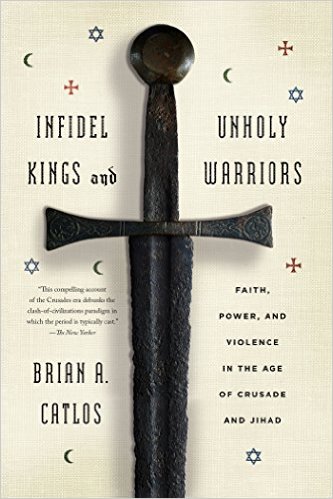
Infidel Kings and Unholy Warriors: Faith, Power, and Violence in the Age of Crusade and Jihad
Tom Verde
Brian A. Catlos
2014, Farrar, Straus and Giroux, 978-0-80905-837-2, $28 hb.
Despite the growing body of revisionist histories of the Crusades, these medieval “holy” wars still “invite preconceptions,” states Catlos at the outset of this engaging study. He warns that polarizing the Crusades in terms of East vs. West, Christian vs. Muslim (and Jew), and orthodoxy vs. heresy eclipses the fact that “the greatest tensions and the worst violence tended to take place among people of the same faith” and political leaders bent upon “personal and earthly agendas.” The Crusader sacking of Christian Constantinople in 1204 is a notorious example; sectarian struggles within the Fatimid state likewise fueled Islamic “jihads,” not against the invading “Franks” but fellow Muslims who posed a political threat, he writes. Populated by the famous (El Cid, Salah al-Din) and not so famous (Bahram Pahlavuni, aka “The Sword of Islam,” an Armenian Christian in the Fatimid court), Catlos’s account reemphasizes the enlightened view that “we cannot blame religion for the violence” of the Crusades.
You may also be interested in...

Umayyad Family Dynasty Creates Unprecedented Empire
Explore the development and history of the Umayyad Caliphate, one of the most consequential empires the world has ever known.
Dissolved Monopoly’s Legacy Hinges on How India Honors Its Political Architecture
From the first fortified trading post in northeastern India, historian Rosie Llewellyn-Jones tracks the physical changes wrought by the English East India Company.
The Great British Bake Off Winner Nadiya Hussain Gathers Global Recipes in Culinary Celebration of Ramadan
Nadiya Hussain's diverse recipes highlight the global unity of Muslim cultures and cuisines.